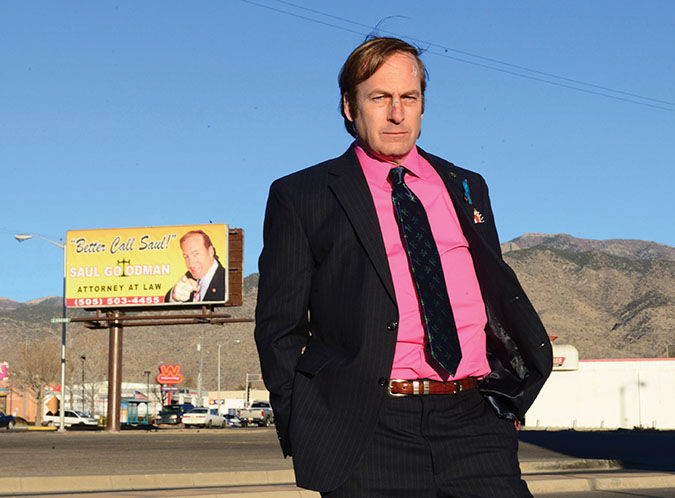In the interest of journalistic integrity, I must self-report that the following article is biased. The new show “Better Call Saul,” the prequel to AMC’s seminal series “Breaking Bad,” has now been loosed on the public. Being a self-proclaimed “addict” of “Breaking Bad,” I went into the first two episodes of “Better Call Saul” predisposed to not just like the show but to be entranced by it.
But after standing back a couple of days from viewing the first two episodes of “Better Call Saul,” I still possess the same level of enthusiasm for it. That probably overrides my predilection for the subject matter.
Both “Better Call Saul” and its progenitor “Breaking Bad” examine the fall of each show’s protagonist. In either show you really can’t say the “rise and fall” because both characters, Walter White in “Breaking Bad,” and Saul Goodman in “Better Call Saul,” never really rise to the top professionally personally or in any other way, unless you want to count Walter White’s ascension as a drug lord a professional achievement.
But whereas Walter White in “Breaking Bad” takes a dramatic and over-the-top theatrical leap into the darkness via entry into the methamphetamine industry, Saul Goodman, who in this show is named Jimmie McGill thus far, has a much more subtle descent.
Saul’s demise is not going to be a meteoric collision with the ground at the speed of light — at least not yet. His will be a death of a thousand cuts as the first two episodes already make explicitly clear by Saul/Jimmie beginning to pile up legal indiscretion upon legal indiscretion and accenting it with his own unique style of moral failings.
I think it’s safe for me to predict that Saul or Jimmie or whatever his real name turns out to be is not going to be having a road to Damascus moment of spiritual clarity and see the crooked path he is on … or will he?
As I have written about “Breaking Bad” before, the creators of both these epic examples of good television are not bent on giving the world a dissertation on sound Catholic Moral Theology, but the very Catholic element of sinful gradations rears its head in “Better Call Saul” from the very outset.
Petty crimes and cheap legal cons have opened the door to graver sins in the way tinkering with a Ouija Board might invite unclean spirits into places you don’t want them to go. But like “Breaking Bad” before it, “Better Call Saul,” a show about a low-rent, small town lawyer who is on his way to lying and cheating and worse in a race to the bottom, is still fertile ground for the examination of spiritual gifts and moral land mines.
Saul Goodman (did they choose the name for ironic purposes or maybe something even deeper?) is a better person than Walter White. We know that from just the first two episodes of both shows. Walter White of “Breaking Bad” seethes with resentment and envy. It stays bottled up for a while, but when it comes out, it is best to run for cover.
Saul Goodman, on the other hand, has already demonstrated some peculiar moments of compassion and decency. He represents a lawyer from a high-powered law firm who has obviously gone off the rails emotionally and psychologically and seems utterly friendless … except for Saul Goodman.
And when Saul Goodman finds himself tied up with duct tape in the middle of the desert and has to make the case for his own life to a crazed drug kingpin named Tuco (who “Breaking Bad” fans know all too well), the ensuing “closing arguments” Saul makes on his knees would make Clarence Darrow envious.
But Saul is not content with just saving his own skin. When Tuco passes judgment on Saul that he is going to be allowed to live, Saul is free to go. Yet he risks his life and incurring the wrath of the unstable Tuco to argue for the mitigation of the sentences Tuco has in store for Saul’s two compatriots in a failed shakedown scam that has gone horribly wrong.
Now, compound fractures of two tibias may not seem like a light sentence to Saul’s partners in larceny, but the alternative Tuco was considering, which involved a rather large knife and the larynx of each individual, has Saul Goodman shining.
What “Better Call Saul” does so well, so far, and what its predecessor “Breaking Bad” did likewise, is not so much celebrate sin or the failing of the human spirit, but rather explore a kind of alternative dimension whereby fictional people in extraordinary situations act out very real and everyday moral or immoral choices.
Because it’s a “prequel,” we already know where Saul Goodman winds up. The pull of watching “Better Call Saul” will be discovering the tragic, comic and thought provoking way he got there.

